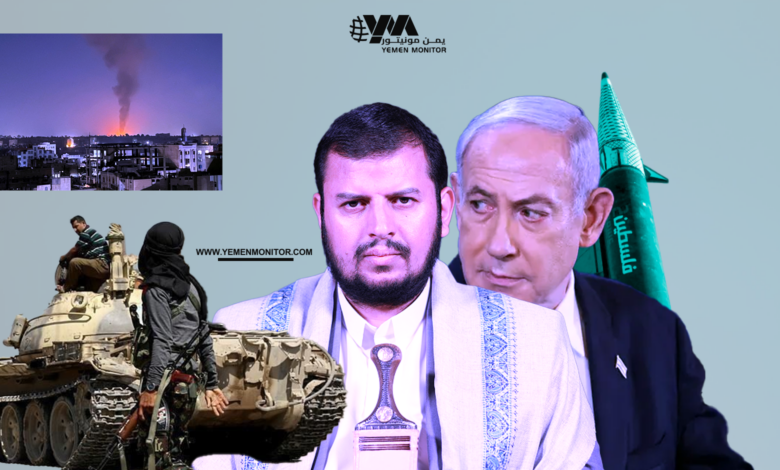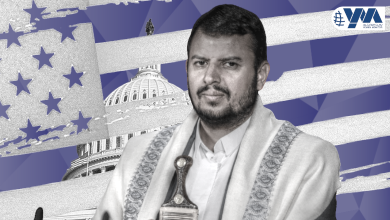
Yemen Monitor/ Analysis Unit:
The Qatari Prime Minister officially announced on Wednesday the success of the mediation in which his country participated, in cooperation with the US and Egypt, in reaching a ceasefire agreement in Gaza, which will enter into force next Sunday. This agreement puts an end to the 14-month suffering of the people of Gaza and raises questions about its potential impact on the situation in Yemen, where peace efforts have stumbled due to the Houthis’ indirect involvement in the war.
After the outbreak of the Gaza war, the Houthis intensified their attacks on shipping vessels that they claimed were linked to Israel or destined for the ports of occupied Palestine, under the slogan of supporting the people of Gaza. They also linked the cessation of their attacks, which extended to include US and British ships, to a ceasefire in Gaza and the lifting of the siege on it. At the same time, the Houthis launched missile and drone attacks against Israel. Although these attacks did not make a tangible difference in improving the military or humanitarian situation in Gaza, they relied on the praise of the resistance leadership, forgetting that this praise is symbolic and moral rather than recognition of its real impact.
Over time, the Houthi attacks have reflected on the political process in Yemen, as they caused the suspension of the implementation of the “roadmap” reached by Saudi Arabia and the Houthis, facilitated by the Sultanate of Oman and sponsored by the US special envoy for Yemen, Tim Lenderking, without the participation of the internationally recognized Yemeni government.
This suspension came as a result of an US decision linking the resumption of negotiations to the cessation of Houthi attacks on Israel, which means that the decision has nothing to do with the Houthis’ activities inside Yemen, which seem unimportant to Washington and other major countries, but rather with Israel’s security. In this way, Washington linked the fate of peace in Yemen to the security of others, just as the Houthis linked the fate of peace to their external adventures in order to achieve political gains at a low cost, in addition to implementing Iran’s regional agenda within the framework of the “axis of resistance.”
The roadmap included a Saudi commitment to pay the salaries of employees according to the 2014 payroll for a period of six months, renewable, with a total value of $1.2 billion. The amount was supposed to be paid to the Houthis in monthly installments of $100 million. However, Washington obstructed this agreement, citing its classification of the Houthis as a Tier II terrorist organization, a classification that prohibits the financing of terrorist organizations.
However, US motives go beyond this legal framework; they are primarily linked to Israel’s security. On the other hand, the Biden administration’s failure to stop Houthi attacks through airstrikes has raised questions about the seriousness of US deterrence, especially in light of the vast military capabilities possessed by Washington.
It is expected that the ceasefire agreement in Gaza will contribute to stopping Houthi attacks, which may lift the US veto on the implementation of the roadmap. However, the question remains about the validity of the roadmap after the regional changes, especially with the decline of Iran’s influence in Lebanon and Syria.
The Israeli factor also plays a role in determining the future of peace in Yemen, especially with the announced positions of responding broadly to Houthi attacks, which means the continuation of airstrikes at least, giving the Houthis a justification for continuing their attacks under the pretext of self-defense, and thus diminishing hopes of reviving the peace process.
For Israel, the issue is about the reputation of deterrence that it is trying to solidify in the region after it was damaged following the attacks of October 7th. This means that the response is part of a “punishment” for the Houthis for their attacks that have damaged this reputation, especially after the failure of air defense systems more than once to intercept missiles.
In this context, Palestinian academic and expert on Israeli affairs, Dr. Muhannad Mustafa, expects Israel to continue targeting the Houthis even if the Gaza war stops because it no longer links it to stopping its strikes due to the escalation of Houthi attacks, which have brought Israeli retaliation against civilian economic infrastructure to Yemen.
According to military experts, airstrikes alone may not achieve a sufficient response for Israel, which opens the door to the possibility of Trump pushing to allow a ground military operation against the Houthis with the participation of Yemeni forces selected based on American criteria.
When discussing this possibility, it should be recalled that Saudi Arabia’s position on the war in Yemen is against this option according to the stated statements, but what is new is what the Houthi leader Muhammad Ali al-Houthi said in a recent interview with Al Mayadeen channel, where he said that Riyadh informed them that it does not want escalation, but it may not be able to refuse to join any military alliance if it is offered, in reference to the possibility of forming an alliance led by Trump if he is convinced by Israel’s request.
It is worth noting that just as US President-elect Donald Trump was able to persuade the Israeli Prime Minister to accept a ceasefire in Gaza, which he had tried to evade, he has a strong opportunity to move forward toward achieving peace in Yemen, in fulfillment of his promise to work towards spreading peace in the world instead of igniting wars.
If the ceasefire agreement in Gaza is implemented, it may end the justifications that the Houthi group has been providing for continuing its attacks, including attacks in the Red Sea, which also means the end of Israel’s justification for striking Yemen. Consequently, this may put the diplomatic track back on the right track.
Ultimately, the regional factor once again enters into determining the future of peace in Yemen, this time through Israel as it was previously through other countries such as Saudi Arabia and Iran, which means that without understandings between these parties, in addition to Trump’s role in balancing the interests of his allies, and his personal vision for the situation in Yemen, if any, peace will be further than it seems close, and the international community may have to go beyond the stage of containing the Houthis to a stage of weakening them, in order to pressure them to accept peace.




